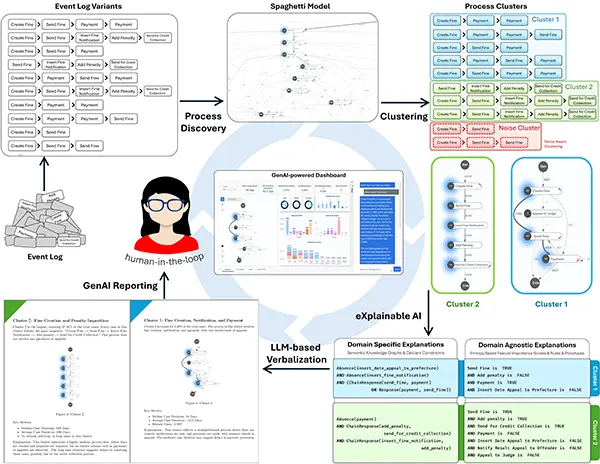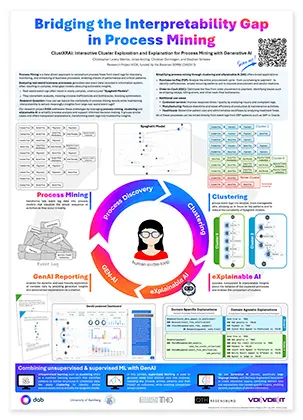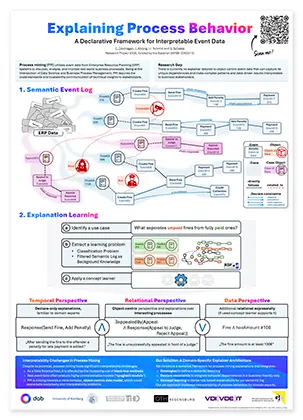BayVFP-Project KIGA
Project description
The aim of the project is to develop semantic methods in process mining in order to analyse business processes holistically, transparently and comprehensibly. The focus here is on the semantic enrichment of event data, through which process contexts and relationships can be explicitly modelled. A so-called semantic event log was developed for this purpose, which records domain-specific knowledge in a structured manner and enriches it using ontology-based and declarative methods. This forms the basis for new methods of explainable artificial intelligence (XAI) in process mining. On this basis, the following technical results were achieved, among others:
- Explainable clustering methods that group process instances transparently and describe their differences based on rules
- An LLM-supported explanation module that automatically explains process patterns and key figures in understandable language
- The integration of all components into an interactive dashboard that enables intuitive analyses by specialist users
- A modular demonstrator for applying the developed methods to real company processes
These approaches not only make process analyses data-driven, but also comprehensible and connectable for companies.

Research Focus
- Investigation of semantic methods for knowledge representation and inference methods for process discovery approaches.
- Semantic representation of causality relations and process properties in knowledge graphs, especially semantic event log.
- Development of machine learning methods for process discovery (white box approach) with inductive logic programming (ILP) methods.
- Explained interactive machine learning methods for intelligent dashboards with a human-in-the-loop approach.
- Conducting studies and experiments as part of a usability study to evaluate the research results.
Project Posters
Publications
Publications
- Christian Dormagen, Jonas Amling, Stephan Scheele, and Ute Schmid. Explaining Process Behavior: A Declarative Framework for Interpretable Event Data. Accepted for publication in: Proceedings of the 3rd World Conference on eXplainable Artificial Intelligence (XAI 2025), Late-Breaking Work Track.
- Jonas Amling, Emanuel Slany, Christian Dormagen, Marco Kretschmann, and Stephan Scheele. Bridging the Interpretability Gap in Process Mining: A Comprehensive Approach Combining Explainable Clustering and Generative AI. Accepted for publication in: Proceedings of the 3rd World Conference on eXplainable Artificial Intelligence (XAI 2025), Main Track.
- Christopher Lorenz Werner, Jonas Amling, Christian Dormagen, and Stephan Scheele. ClustXRAI: Interactive Cluster Exploration and Explanation for Process Mining with Generative AI. Accepted for publication in: Proceedings of the 3rd World Conference on eXplainable Artificial Intelligence (XAI 2025), Demonstrator Track.
- Jonas Amling, Stephan Scheele, Emanuel Slany, Moritz Lang, and Ute Schmid. Explainable AI for Mixed Data Clustering. In: Longo, L., Lapuschkin, S., Seifert, C. (eds.) Explainable Artificial Intelligence - 2nd World Conference, xAI 2024, Proc., Part II. Commun. Comput. Inf. Sci., vol. 2154, pp. 42–62. Springer (2024). https://doi.org/10.1007/978-3-031-63797-1_3
- Anjali Singh, Zineddine Bettouche, and Andreas Fischer. Synthetic Training-Data Generation for ML-based Process Mining Tools. In: Proceedings of the 14th International Conference on Advanced Computer Information Technologies (ACIT 2024). IEEE, 2024. https://doi.org/10.1109/ACIT62333.2024.10712516
- Christian Dormagen. Towards Semantic-driven, Declarative and Interactive Process Mining. In: Proceedings of the ICPM 2023 Doctoral Consortium and Demo Track. CEUR Workshop Proceedings, vol. 3648, CEUR-WS.org, 2023. Available at: https://ceur-ws.org/Vol-3648/paper_6521.pdf.
- Zineddine Bettouche. Transforming Process Mining: A Transformer-Based Approach to Semantic Clustering in Event Log Analysis. In: Proceedings of the ICPM 2023 Doctoral Consortium and Demo Track. CEUR Workshop Proceedings, vol. 3648, CEUR-WS.org, 2023. Available at: https://ceur-ws.org/Vol-3648/paper_7661.pdf.
Student Projects:
We are always looking for students who would like to contribute to the KIGA project in the form of a thesis, a project or as a student assistant. If you are interested, please feel free to contact us.


